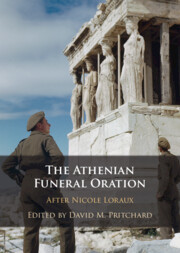Book contents
- The Athenian Funeral Oration
- The Athenian Funeral Oration
- Copyright page
- Contents
- Figures and Tables
- Contributors
- Foreword
- Preface
- Abbreviations
- 1 The Funeral Oration after Loraux
- Part I Contexts
- Part II The Historical Speeches
- Part III The Literary Examples
- 8 Gorgias’ Funeral Oration
- 9 Authorship and Ideology in Lysias’ Funeral Oration
- 10 Corrupting the Youth in Plato’s Menexenus
- 11 ‘To Gloat Over Our Catastrophes’: Isocrates on Commemorating the War Dead
- Part IV Intertextuality
- Part V The Language of Democracy
- References
- General Index
- Index of Sources
8 - Gorgias’ Funeral Oration
from Part III - The Literary Examples
Published online by Cambridge University Press: 11 January 2024
- The Athenian Funeral Oration
- The Athenian Funeral Oration
- Copyright page
- Contents
- Figures and Tables
- Contributors
- Foreword
- Preface
- Abbreviations
- 1 The Funeral Oration after Loraux
- Part I Contexts
- Part II The Historical Speeches
- Part III The Literary Examples
- 8 Gorgias’ Funeral Oration
- 9 Authorship and Ideology in Lysias’ Funeral Oration
- 10 Corrupting the Youth in Plato’s Menexenus
- 11 ‘To Gloat Over Our Catastrophes’: Isocrates on Commemorating the War Dead
- Part IV Intertextuality
- Part V The Language of Democracy
- References
- General Index
- Index of Sources
Summary
Within the group of classical Greek texts that we call funeral speeches, two have been passed down to us only in fragmentary form. We have just one single sentence from Archinus’ Epitaphios, and we know only a small number of relatively short quotations and paraphrases from Gorgias’ Epitaphios. Not surprisingly, these two texts are the least studied and the least well understood within the group of known funeral speeches. This chapter show shows that Gorgias’ Epitaphios played a vitally important role in the early formation of the literary genre. It begins with an overview of the text and the tradition of Gorgias’ literary version of a funeral oration before exploring its content, date, audience and purpose as well as its impact on the later funeral speeches. This chapter concludes that Gorgias’ Epitaphios was most likely composed and disseminated at some point in the last quarter of the fifth century, that the text was intended to be received primarily by an elite literary audience, and that Gorgias’ Epitaphios conveyed direct criticism of Athenian power politics at the time.
- Type
- Chapter
- Information
- The Athenian Funeral OrationAfter Nicole Loraux, pp. 181 - 197Publisher: Cambridge University PressPrint publication year: 2024

